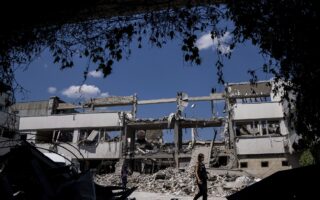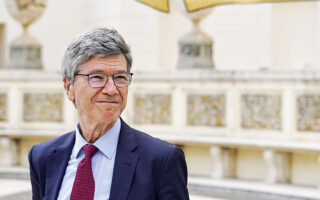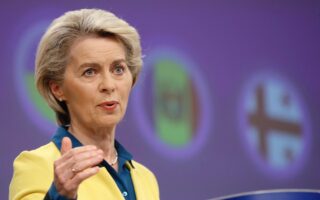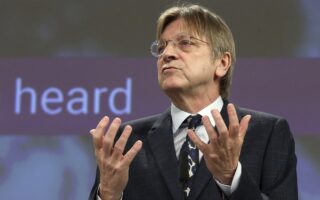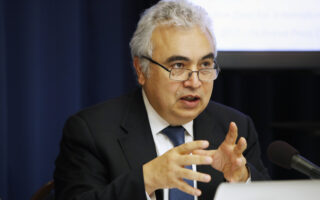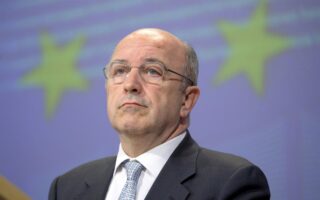‘Russian invasion is historical experience’
President Zuzana Caputova speaks to Kathimerini about bilateral ties, Ukraine and energy
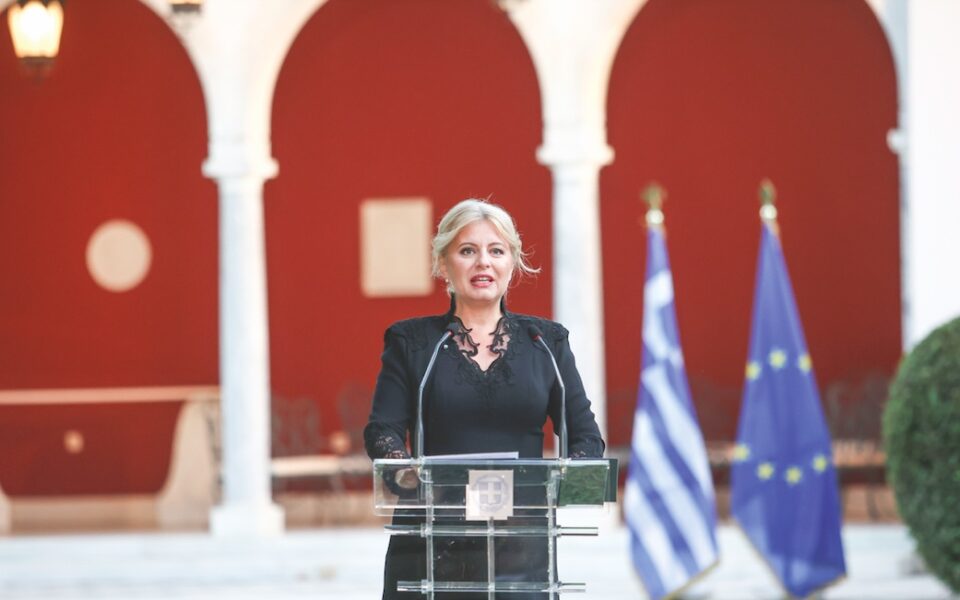
Slovak President Zuzana Caputova visited Athens on Tuesday as the political crisis gripping her country peaked, after the four-party coalition government of Premier Eduard Heger lost its parliamentary majority, following the resignation of ministers from the center-right Freedom and Solidarity (SaS).
In an interview with Kathimerini, Caputova avoided discussing the current political instability, which may lead her country to early elections. In foreign policy, both SaS and the populist Ordinary People (OLaNO) party, which remains in power, have agreed to provide undivided support to Ukraine.
Notably, in late August, Slovakia donated all of its air force’s MiG aircraft to Kyiv, and it is now relying on the Czech Republic and Poland to monitor its airspace until it receives American fighter jets. “Moscow demanded a de facto veto over military infrastructure and NATO’s presence in Central Europe. This is unacceptable,” she said, explaining her support for Ukraine.
The polls show that public opinion in the country is less certain about these issues. How will Bratislava manage to maintain its position when the energy crisis starts to bite? Also, what is Slovakia’s view – a country of 5.4 million people – on German Chancellor Olaf Scholz’s vision that, in the future, some EU countries will not have veto power on certain policy areas? “When it comes to areas such as foreign policy, it is legitimate to consider moving towards majority voting,” Caputova replies.
This is the first visit by a head of state of Slovakia to Greece in more than 15 years. Could you tell us about the strengthening of the bilateral bonds between Greece and Slovakia?
Indeed, I am very glad to be the first Slovak head of state to visit your country in 15 years. I see it not just as a confirmation of very good relations between our countries, but especially as a signal that we want to deepen them further.
This is not just about Slovakia’s help last year with forest fires in Greece. Each Slovak carries a piece of your country in their heart as they acquaint themselves with the history of ancient Greece, which laid the foundations of European culture. And for us in Slovakia it is great to see the recognition you have given to Vojtech Zamarovsky, a great Slovak author and historian of ancient Greece. Our countries are close partners in the EU and allies in NATO. We share the same views on many priorities, such as the need to address the energy crisis or the European integration of the Western Balkans.
There’s much more we can do together bilaterally as well. Both our countries are experiencing the impact of the climate crisis, we have both embarked on green transition and plan to phase out coal. This is why my delegation for this visit also includes experts and entrepreneurs from the area of green tech and clean tech, as well as experts on forestry and water management. And I have also brought representatives of an innovative community project for Roma inclusion to meet partners in Greece and discuss potential cooperation in this area.
You have said that after the Russian aggression in Ukraine, Slovakia cannot feel safe. Have you received any concrete threats from Russia? Is this declaration meant to help increase support among the people of Slovakia for the foreign policy choices of the government?
Ukraine is our neighbor. If Moscow’s aggression – which is in an absolute breach of international law – succeeds, we would have Russia directly on our borders. At the same time, last December, in its proposed draft treaty between Russia and NATO, Moscow demanded a de facto veto over military infrastructure and NATO’s presence in Central Europe. This is unacceptable – and it would turn us into second-class members. Moreover, Slovakia had direct experience with Soviet expansion – we had Soviet tanks in our streets in 1968. For us, Russia’s invasion is not a theoretical possibility, it is real historical experience. Luckily, unlike in 1968, today, Slovakia is a NATO member and we appreciate the support and cooperation in the Alliance, including the reinforcements on NATO’s eastern flank.
What is Slovakia doing to protect itself during the energy crisis?
The energy crisis is affecting all EU countries. Unfortunately, Slovakia has for a long time been dependent on Russia’s energy supplies, so the first and immediate step is diversification away from Russia. We have purchased additional volumes of gas from other countries, including LNG, and finished a gas interconnector with Poland. As part of the preparation for this winter, our gas storage facilities are being filled. When it comes to electricity generation, we have launched a new reactor at one of our nuclear power plants. But the energy crisis is also an opportunity to speed up green transition and the use of renewables – because this will help our planet and decrease our dependence on potential whims of those who see gas as a political weapon.
Your country has shown great solidarity toward Ukrainian refugees. Can you describe the refugee situation now, more than six months after the start of the war?
Indeed, more than 700,000 refugees have crossed our border from Ukraine, more than 90,000 have stayed. The reaction from our society has been very warm, Slovaks opened their homes and hearts to our neighbors. Many of them found new friends here, many of them go to school or work – even though we know many of them long to go home as soon as possible. We are working on more ways to advance their inclusion – especially at a time when we are facing the challenge of rising inflation and soaring energy prices. Accepting so many refugees is a new and important experience which our society hadn’t had before.
In his speech in Prague, German Chancellor Olaf Scholz presented a vision for the EU without national vetoes in many policy areas. What are your thoughts on that?
When it comes to further EU enlargement, I think a debate on how we work internally in the EU is necessary. In this regard, when it comes to areas such as foreign policy, it is legitimate to consider moving towards majority voting.
Has there been any change in the official position of Slovakia when it comes to Kosovo?
Slovakia’s position remains unchanged. We fully support the Pristina-Belgrade dialogue and see it as the primary way of resolving issues between Serbia and Kosovo.
